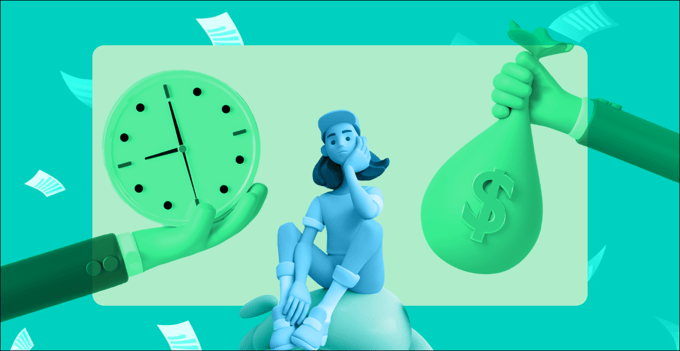Living from paycheck to paycheck means all of your salary that comes in on payday goes back out again by the month-end. If you’re one of those people, stick around for tips on crawling your way out of this situation.
By now, you probably would’ve figured out that having no money can cause a constant slew of financial and emotional problems (if not, why are you reading this article?).
These include
- Having no money for sudden emergencies
- Piling debt and interest rates from when you borrowed money
- Fees from late bills, negative balances and overdrawn accounts, which all contribute further to the spiralling situation
- The stress of constantly checking your bank account balances to make sure you have money to buy anything
‘Fess up: Identify that you live from paycheck to paycheck
If you’re unsure if you’re living from paycheck to paycheck, ask yourself these questions:
- Do you put off essential expenditures, such as buying food and paying your insurance or rent until after receiving your salary?
- Do you not even consider large purchases, like going on a staycation or cruise, because you never have enough money?
- Do you have little or no money in your savings account?
If your answer is ‘yes’ to any of these three questions, then you are probably living paycheck to paycheck. Here are some tips on crawling your way out of the cycle.
Automate your savings
If you’re someone who saves whatever’s leftover at the end of the month, you’ll never save much.
You should always pay yourself first when you get your paycheck, followed by the rest of your spending and expenditure. We mean stashing money away towards your savings or retirement fund by paying yourself first (think of it like self-inforced CPF).
For people who have difficulty doing that, we recommend that you set up an automatic transfer on payday from one bank account to another savings account (perhaps with a different bank). This ensures a set amount of money is saved every month.
Using an account that is not accessible or easy to log in also helps. Perhaps stick with a web login instead of downloading the app on your phone where you can see the balance every day.
Also, if you choose to set up a savings account with a different bank, select a bank that gives you higher interest rates, such as OCBC 360 or UOB One.
Create an excel spreadsheet to keep track of monthly expenses
If you find yourself with S$0 at the end of the week and are going hungry until your next paycheck, you’ve probably trapped yourself in a lifestyle you can’t afford.
Particularly in this case, where you have limited financial resources, you should be even more disciplined with your money.
Start tracking your expenses by drawing up an excel sheet and noting every cent that leaves your pocket.
If you need motivation, here’s how Singaporean artiste Nat Ho found himself with only S$16 in his bank account at 27 how he bounced back in a couple of years.
Identify needs and wants; cut down on spending as much as possible
After jotting your expenses down after a month, take a good hard look at your expenditure. From there, decide if there is anything you could do without.
Some of your expenses are necessary — rent, insurance, food, electricity and phone bills — but what’s leftover is more flexible.
Rank your discretionary spending from most to least important — from what’s really needed to something you simply want to have.
For example, gym memberships. Do you need a S$150 membership for a private gym, or can you use a public ActiveSG gym?
Here are also some monthly subscriptions that many Singaporeans pay for — see if you’re able to leech an account from your friends instead to save money:
- Netflix
- Spotify
- YouTube Premium
- Other on-demand video and music streaming websites/apps
You’ll realise even the most minor luxuries can cost you a pretty penny when you're broke. It’s important to go through your credit card statements to see what you’re actually paying for and whether you’re still using the service. If not, cancel them.
Save your raises, AWS and bonuses
Getting a raise isn’t a reason to increase your monthly expenditure. Continue spending the exact amount you did when you started your job before the raise.
Whenever you receive a salary bump or bonus, use it to build up your emergency savings or bolster your retirement fund.
Find your motivation
Do you have a BTO coming up? Getting married? Or perhaps want a family with kids in the future? If so, you need to start saving up.
You must have a dream or a goal that you want to work towards. Otherwise, why cut that Disney+ subscription? You have to believe that making a small change now will lead to a better life in the future.
Get trusted friends to help you with your goals
Announce it on Instagram or tell your closest friends. Say it out loud that you’re going to get your finances back on track because when you end up riveting back to your old ways, you’ll only be embarrassing yourself.
We recommend working with a financial advisor, relative, spouse or a trusted friend to increase your chances of success.
Start investing
It doesn’t matter even if it’s S$1 per day — you can start investing with robo advisors such as Stashaway, which requires no minimum deposit.
You should try something with a low-risk first if you've just gotten started, such as ETFs. Once you’ve built confidence and experience, you may gradually increase your portfolio risk to accelerate your wealth accumulation.
Don’t put all your eggs in one basket; invest broadly and diversify the risk.
Don’t just pick stocks from the US market — diversify broadly so that specific market developments like US-China trade tensions will not cause a catastrophic loss.
Similar articles
Budgeting 101: Understanding Needs vs. Wants
8 Sneaky Signs That Lifestyle Inflation Is Delaying Your Financial Freedom
15 Ways You’re Secretly Sabotaging Your Own Finances
How Can Singaporeans Stop Living Paycheque to Paycheque?
A Singaporean’s Guide To Stop Overspending — Simple Money-Saving Hacks You Can Follow To Get Your Budget Under Control
How to Stretch An Entry-Level Salary in Singapore
7 Signs You’re Living Beyond Your Means in Singapore
7 Signs You’re On the Right Track to Financial Success at 25










.png?width=280&name=Investments%20(6).png)